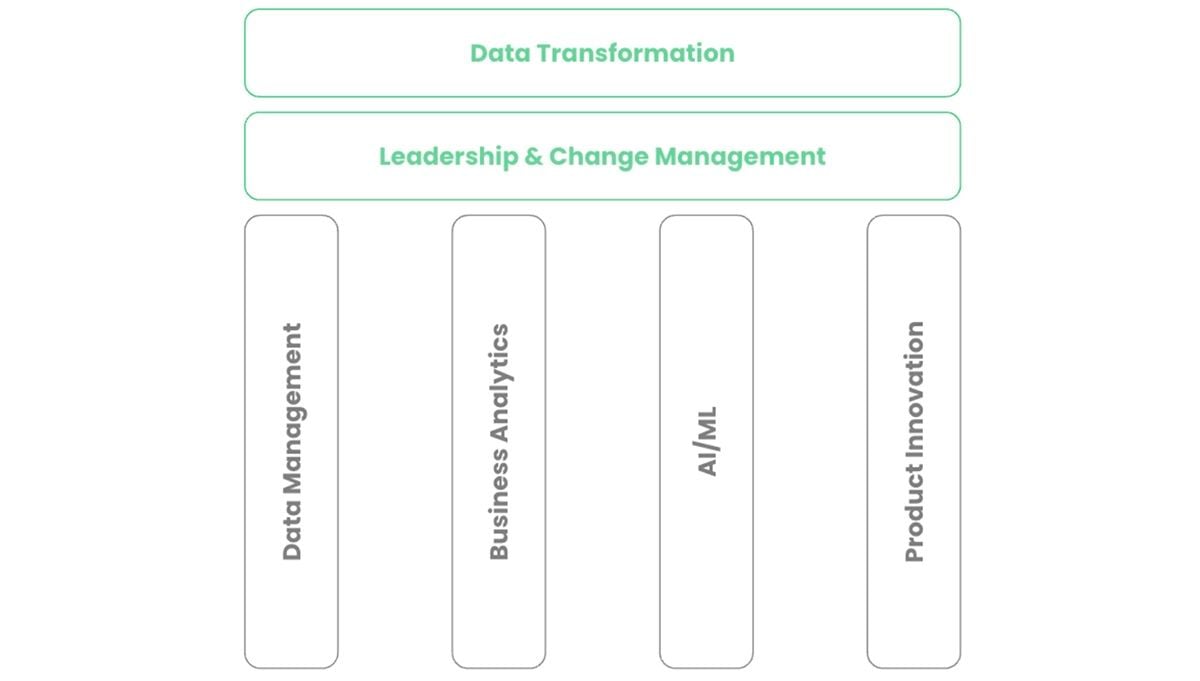Why Upskilling Is So Important in Launching a Digital Transformation

The past few years have been marked by unprecedented levels of digital transformation—and by all measures, this trend shows no signs of slowing.
According to McKinsey & Company, the COVID-19 pandemic caused a surge in digital adoption, with companies advancing their technology use by three to seven years in just a few months. But that was just the start. The International Data Corporation (IDC) found that global spending on digital transformation will reach $3.4 trillion in 2026 with a five-year compound annual growth rate (CAGR) of 16.3%.
While factors like rapidly-changing technology, global market disruptions, and evolving customer demand are driving these digital transformations, results remain mixed—in part because of significant skills gaps. In fact, 42% of companies that have not undertaken digital transformations report that the primary reason was difficulty sourcing the skilled employees they need. Companies need to focus first and foremost on their talent to make the most of today’s push toward digital transformation.
The Importance of Upskilling in Digital Transformation
Though a McKinsey survey found that 9 in 10 organizations have attempted a digital transformation in the last two years, less than a third of respondents report experiencing the revenue benefits they expected. One of the major differentiators between companies that succeed and those that don’t is talent management, both at the front-line and executive levels.

While many companies fail to complete regular skills gap analyses, even those that do often underestimate the size of their gaps. But, as McKinsey reports, “You can’t hire or outsource your way out of your talent problems.” Developing skills in-house is both more cost-effective and better for business continuity. As companies invest in digital transformation efforts, upskilling to build in-demand capabilities and ensuring an organization-wide base of digital literacy are essential.
Upskilling Across the Organization
A successful digital transformation requires across-the-board buy-in—but that doesn’t mean a company’s accountants and copywriters need to learn to code. Instead, savvy organizations offer upskilling opportunities adapted to different functional areas’ unique needs.
When Colgate-Palmolive recently embarked on a global digital transformation effort, Chief Digital Officer Brigitte King led an upskilling initiative with multiple “tranches.” The company offered digital fundamentals training for a broad employee base; digital practitioner modules for a more refined subset of employees who needed more depth; and senior level upskilling to ensure executives were on board.
At Emeritus, our Digital Transformation Academy is built on a similar approach, with a curriculum adapted for three different groups: leaders, practitioners, and the broader organization.

1. Strategy: Upskilling Leaders
Company leaders play an outsized role in determining the success of a digital transformation. If they don’t understand the potential of new technology, for example, they might block promising initiatives at the pass. Leaders in all roles (not just technology) benefit from learning about industry trends, new technological approaches, and the necessary investments and resources to implement new tools. Upskilling efforts for leaders should be highly targeted, focusing on strategic possibilities rather than the nuts and bolts of new technologies.
2. Mastery: Upskilling Practitioners
Technical practitioners, of course, need the skills to do the work of implementing a transformation. Employees in this category might include IT staff in charge of rolling out new tech or marketing professionals shifting to new digital approaches. Upskilling programs for these team members should focus on delivering critical skills while providing broader context as needed.
3. Literacy: Upskilling the Employee Base
In a successful digital transformation, new technologies and processes touch every aspect of the organization. That’s why employees at all levels and in all functions must develop digital fluency and learn to effectively collaborate with their colleagues using new tools. Upskilling programs in this category should be broadly accessible and provide context to participants on why and how digital transformation efforts will impact their work.
Emphasize M-Shaped Skills
When developing an upskilling program to support a digital transformation, it’s important that companies avoid boxing employees into their functional areas too tightly. Traditionally, most professionals developed a “T-shaped” skill set, meaning they had a broad base and then a depth of knowledge in one specific area. To thrive in today’s workplace, companies should instead focus on developing employees with M-shaped skill sets, meaning that they have a broad base but also several areas of strong functional expertise.

This approach to skill-building is good for both employees and employers. For companies, it means employees can effectively collaborate across functions in an increasingly multidisciplinary environment, and also that they are poised to move into new roles. For individuals, it opens up a broader range of job opportunities in a fast-changing business climate. In practice, this approach might mean offering a marketing professional an upskilling opportunity in advanced analytics, or encouraging a product manager to delve deeper into the tech they work with.
Soft skills are also an important upskilling consideration, especially during times of change for the organization. As King explained, “Transformations require both soft skills and hard skills in terms of change management to break down silos; get people to work differently together; get them to understand that their budgets, their individual objectives, and their priorities are actually codependent on each other.”

Learning Academies: A Tailored Solution for Transformations
Despite the clear imperative for upskilling to support transformation efforts and keep up with changing technology, most companies are lagging when it comes to developing a talent strategy. Creating a home-grown upskilling program is highly resource-intensive, but off-the-shelf learning solutions like Massive Open Online Courses (MOOCs) and content libraries rarely offer the specific knowledge or support employees need to effectively engage with new material.
Emeritus’ tailored Digital Transformation Academy solution, on the other hand, offers a targeted selection of courses taught by leading universities and content specific to your organization’s needs and goals. The academy utilizes a cohort-based learning model, which provides the support and structure professionals need to maximize learning within the context of a busy work and personal life. Plus, our platform are customized with your branding to provide a seamless experience for participants, and we offer bespoke support to ensure progress against your KPIs.

Taking on a digital transformation isn’t easy—but developing the skills you need for success is a crucial first step.
Interested in learning more about Emeritus’s Digital Transformation Academy? Get in touch.




